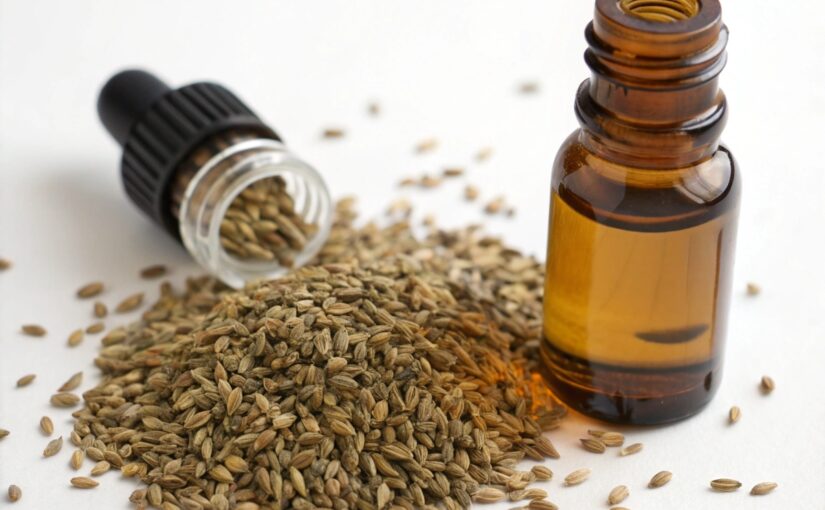Ajwain essential oil, extracted from the seeds of Trachyspermum ammi, has earned its reputation as a dynamic healing oil rooted deeply in both ancient tradition and contemporary wellness practices. Trachyspermum ammi, more commonly known as ajowan, bishop’s weed, or Indian thyme, belongs to the Apiaceae family and is native to India. Today, it is also cultivated extensively in Iran, Egypt, Pakistan, and Afghanistan, where its aromatic seeds have become a staple not only in flavoring foods but also in supporting health and well-being.
Botanical Profile and Extraction
The essential oil is derived through steam distillation of ajwain seeds, resulting in a pale yellowish-brown oil with a thin consistency. What makes ajwain essential oil particularly distinct is its potent aroma, which features a herbaceous, spicy, and medicinal scent accented by a pronounced thyme-like top note. The oil is rich in thymol, constituting about 22.5% of its composition, alongside a range of other active compounds derived from ethanol and acetone extracts. This robust chemical makeup is responsible for the oil’s broad range of therapeutic effects and its enduring significance in traditional healing systems.
Historical and Cultural Significance
Ajwain’s historical legacy is fueled by centuries of use in Ayurveda and Unani medicine, where it has been treasured as a natural remedy for digestive, respiratory, and microbial concerns. The annual plant itself is feathery-leaved and easy to recognize in Indian markets and home gardens, reflecting its widespread integration into both culinary arts and medicinal practices. While the seeds are commonly incorporated into spice blends and savory dishes, the essential oil stands out for its notable health-supportive properties.
Therapeutic Benefits
A key aspect of ajwain essential oil’s value is its powerful antimicrobial and antibacterial capabilities. Scientific studies have demonstrated that both the oil and its ethanol and acetone extracts are effective at fighting bacterial infections. Its antifungal qualities make it suitable for addressing various fungal conditions, and its nematicidal action targets parasitic worms, expanding its usefulness as a natural remedy. Another noteworthy benefit of the oil is its anti-inflammatory and analgesic action, which helps reduce swelling and ease pain, particularly in joints and muscles.
Ajwain oil possesses an impressive array of other health-promoting properties. As a potent antioxidant, it provides significant protection against cellular oxidative damage. Its effectiveness as an antitussive agent means it can help soothe coughs and support respiratory health. Additionally, the oil has anthelmintic and anti-filarial benefits, making it valuable for treating intestinal and filarial parasites. Its hypotensive action, although moderate, suggests its potential for supporting healthy blood pressure levels.
Digestive Support
One of the most valued uses of ajwain essential oil is for digestive support. The oil is renowned for its ability to relieve bloating, gas, and indigestion, making it a reliable option for those seeking natural solutions for gastrointestinal discomfort. As an insecticidal agent, it has also gained popularity as a natural pest repellent for use around the home.
Aromatherapy Applications
Ajwain essential oil is embraced in aromatherapy for its invigorating and clarifying effects on both body and mind. Adding three to five drops to a diffuser with water releases its spicy, therapeutic aroma into the air. This can help purify the environment, support respiratory health, and create an atmosphere that eases breathing and enhances focus. For digestive support, one to two drops diluted with a carrier oil can be applied to the abdomen, while the same preparation applied to sore muscles offers localized pain relief. Direct inhalation, placing a drop or two on a tissue and breathing in the scent, provides quick relief from coughs and congestion.
Emotional and Energetic Effects
Emotionally, the aroma of ajwain oil is uplifting and fortifying. Its warm, spicy fragrance helps dispel mental fog, sharpen focus, and foster a sense of resolve and groundedness. These effects are particularly beneficial during times of stress, fatigue, or diminished concentration.
Blending Suggestions
Blending ajwain essential oil with companion oils such as basil, thyme, peppermint, eucalyptus, and clove can amplify its effects, creating aromatic blends that further support respiratory and digestive health. These medicinal and spicy oils complement ajwain’s properties, resulting in dynamic and effective aromatherapy solutions.
Safety and Precautions
Safety is paramount when using ajwain essential oil due to its potency. The oil must always be diluted with a carrier oil before topical application to minimize the risk of skin irritation. A patch test on a small area of skin is advised, as the oil can provoke sensitivity in certain individuals. Contact with eyes should be strictly avoided, and the oil is meant solely for external use unless supervised by a qualified healthcare practitioner. Those who are pregnant, nursing, or managing specific health conditions, including low blood pressure, should seek professional medical advice prior to use to ensure safety.
Ajwain essential oil is a testament to the marriage of tradition and modern wellness. Its diverse and potent therapeutic actions reinforce its standing as an essential element of any comprehensive aromatherapy toolkit. Yet, despite its robust healing qualities, care and respect for its strength are fundamental to achieving the best results. Whether employed for its physical benefits or its capacity to revitalize the mind and spirit, ajwain essential oil continues to play an important role in natural health and holistic lifestyles.
If your heart finds joy and inspiration here, consider supporting the work that keeps these stories blooming. Your donation, no matter the size, helps sustain authentic research, creative writing, and the spirit of sharing that connects us all.
